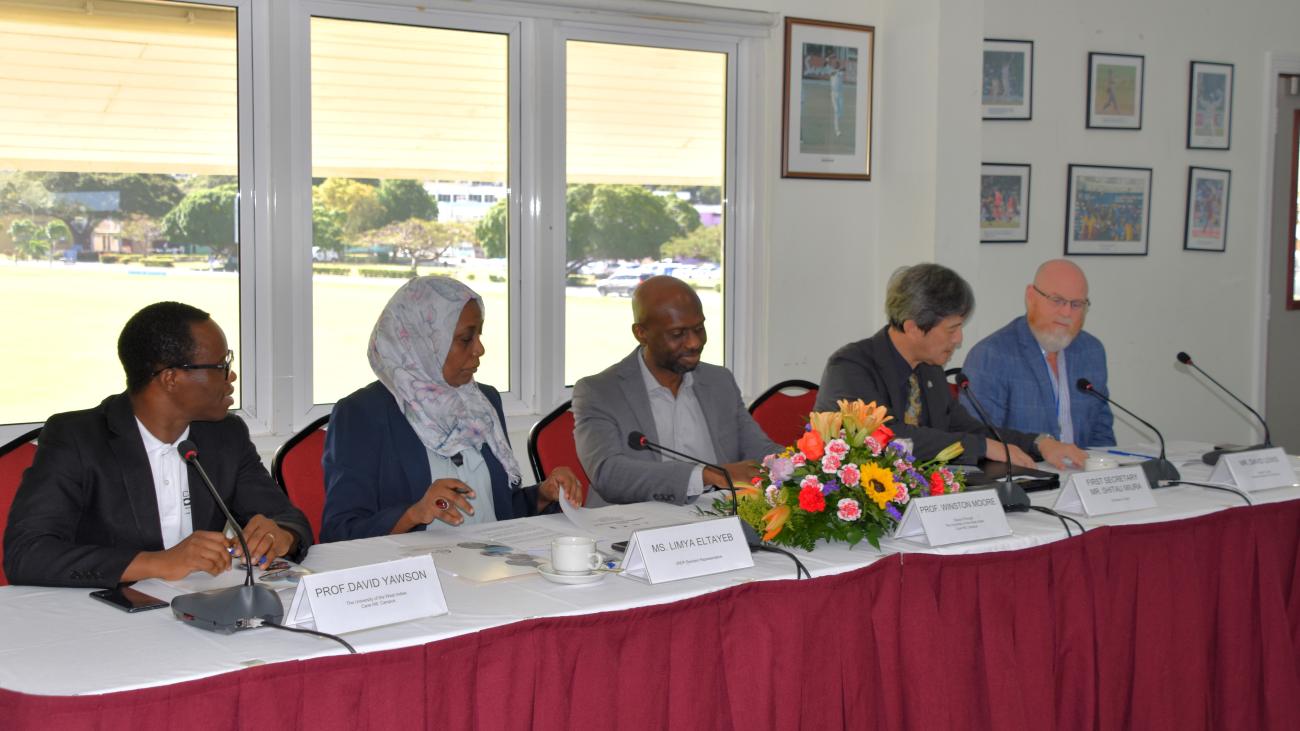UNDP Representative Urges Inclusive Digital Solutions for the Caribbean

The inaugural Caribbean Drone Symposium aims to shift paradigms for environmental resilience.
BRIDGETOWN, Barbados - Caribbean researchers, innovators, practitioners and policymakers are being urged to place resilience and inclusion at the center of homegrown solutions and frameworks related to drone technology.
This was the appeal made by the United Nations Development Programme’s (UNDP) Resident Representative for Barbados and the Eastern Caribbean, Ms. Limya Eltayeb, at the Opening of the inaugural Caribbean Drone Symposium at The University of the West Indies Cave Hill Campus.
“At UNDP, our approach to technology and digital transformation is a comprehensive one. We try to ensure that we can bridge the digital divide; that we can ensure equitable access to technology, that we are improving accessibility for all emerging technologies for all people – as best as we can,” said the UNDP Representative.
Ms. Eltayeb also highlighted UNDP’s open-source platform, DigitalX, as a free resource for the region to access digital solutions for development challenges. She emphasized that UNDP stands ready to support countries in adapting them to their national contexts.
The Centre for Resource Management and Environmental Studies (CERMES) at Cave Hill is hosting the inaugural Caribbean Drone Symposium from February 10 – 12, with the support of the Project for Improving National Capacities for Management of Sargassum, funded by the Government of Japan and implemented by UNDP.
This US$12.3 million initiative aims to address sargassum-related challenges in five Caribbean countries by creating a sustainable sargassum management framework, develop innovative utilization technologies, and foster regional cooperation. It also includes training and capacity development programs to transfer expertise to local stakeholders.
First Secretary at the Embassy of Japan in Barbados, Mr. Shitau Miura, delivered remarks on behalf of Ambassador-designate, His Excellency Mr. Yusuke Miyasaka, and said, “This project reflects Japan's goal of addressing global environmental challenges. Utilizing cutting-edge drone technology is one of the components of the project which could contribute to environmental resilience within CARICOM. We are therefore very much looking forward to a productive discussion by all stakeholders.”
CERMES Director, Professor David Yawson, emphasized the urgent need for a more streamlined approach that integrates technology, regulations and policies, human resource capacity, and services to fully unleash the potential and optimize the benefits of drones in the Caribbean.
“We cannot afford to be left behind in this booming and highly beneficial technology,” he said. “Currently in the Caribbean, this systems approach is missing – resulting in a challenging environment for operators and even academic and research institutions,” he noted, adding, “The purpose of this symposium, which is a springboard of many to come, is therefore to provide a forum for national and regional stakeholders to use the sargassum seaweed phenomenon in the Caribbean as a hub to discuss the utility of drones for environmental resilience and the related challenges of opportunities for enabling a wider use of drones to support resilient and sustainable socioeconomic development in the region.”
The Caribbean Drone Symposium will showcase trends in drone technology, policies and regulations; applications and best practices for environmental resilience; and challenges and opportunities for entrepreneurship and enterprises in the Caribbean.
This story was first published by UNDP Barbados and the Eastern Caribbean.


